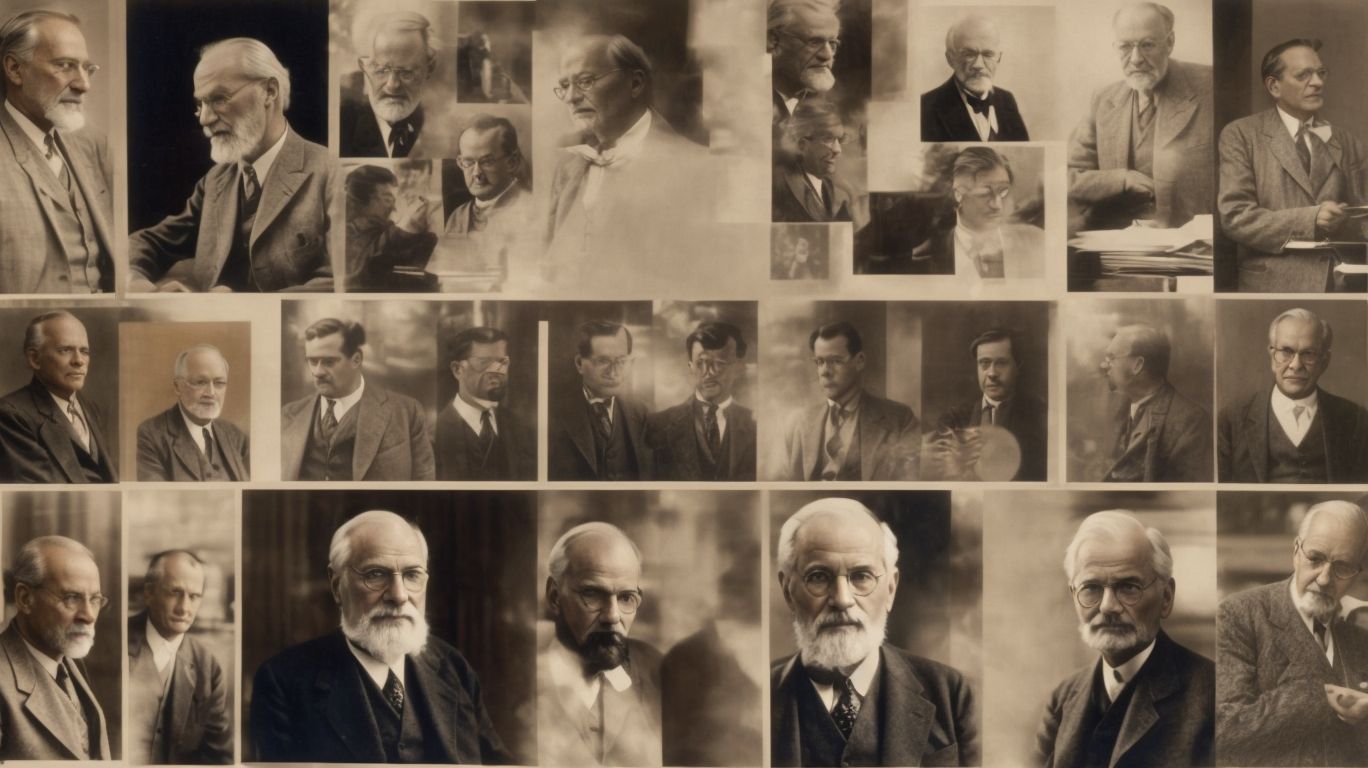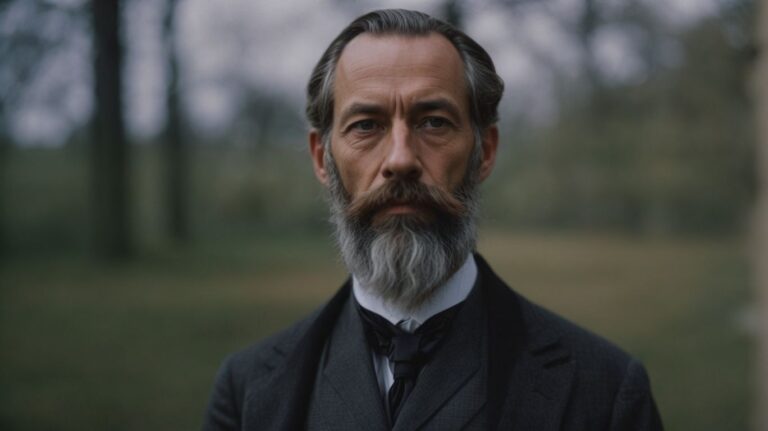Curious about the origins of psychology and the influential figures who shaped this field of study? From Wilhelm Wundt to Albert Bandura, these founding figures have made significant contributions to the diverse branches of psychology, such as structuralism, psychoanalysis, behaviorism, and humanistic psychology. Join us as we delve into the lives and work of these pioneers, uncovering their groundbreaking theories and lasting impact on the field of psychology.
Contents
- 1 What Is Psychology?
- 2 Who Are the Founding Figures of Psychology?
- 3 What Contributions Did These Founding Figures Make to Psychology?
- 4 Frequently Asked Questions
- 4.1 Who are the founding figures of psychology?
- 4.2 What contributions did Wilhelm Wundt make to psychology?
- 4.3 How did William James influence the field of psychology?
- 4.4 What is Sigmund Freud known for in psychology?
- 4.5 What is Ivan Pavlov famous for in psychology?
- 4.6 How did the contributions of these founding figures shape modern psychology?
What Is Psychology?
Psychology is the scientific study of the human mind and behavior, aiming to understand the complexities of consciousness and unravel the mysteries of human behavior.
Through rigorous research methods and well-established theoretical frameworks, psychology delves into the intricate workings of the brain and how they shape our actions, thoughts, and feelings. By utilizing scientific methodologies such as experiments, observations, and statistical analyses, psychologists dissect various aspects of human behavior to gain insight into the underlying psychological processes.
Who Are the Founding Figures of Psychology?
The history of psychology is rich with influential figures who laid the foundation for the field, including Wilhelm Wundt, Sigmund Freud, William James, Ivan Pavlov, and B.F. Skinner, whose contributions shaped the early landscape of psychology.
Wilhelm Wundt, known as the ‘father of experimental psychology,’ established the first experimental psychology laboratory in Leipzig, Germany, in 1879. His emphasis on introspection and the scientific study of conscious experience marked the beginning of psychology as a recognized discipline.
Sigmund Freud, with his psychoanalytic theory, delved into the unconscious mind’s influence on behavior. Freud’s work emphasized the importance of early childhood experiences and the role of the unconscious in shaping personality.
William James, a pioneer of American psychology, introduced the concept of functionalism, focusing on how the mind adapts to its environment. His landmark text, ‘The Principles of Psychology,’ contributed significantly to the field.
Wilhelm Wundt
Wilhelm Wundt, often regarded as the ‘Father of Psychology,’ established the first psychological laboratory at the University of Leipzig, pioneering the field of experimental psychology through his emphasis on objective observation and measurement of human behavior.
His groundbreaking work laid the foundation for the scientific study of the mind and behavior, shifting psychology from a philosophical discipline to an experimental science. Wundt’s advocacy for rigorous experimental methods, such as introspection and reaction time studies, greatly influenced the future direction of psychology. His dedication to objectivity and empirical inquiry inspired generations of psychologists to adopt similar scientific approaches. As a result, Wundt’s contributions are widely recognized as instrumental in shaping psychology into a respected and rigorous scientific discipline today.
Sigmund Freud
Sigmund Freud, the founder of psychoanalysis, revolutionized the field of psychology with his exploration of the unconscious mind, proposing theories that delved into the complexities of human consciousness and behavior.
Freud’s groundbreaking work introduced the concept that much of human behavior is driven by unconscious desires and conflicts. His theory of psychosexual development, which outlined stages like the oral, anal, and phallic, highlighted the formative influence of childhood experiences on adult personality.
Freud’s analysis of defense mechanisms such as repression, projection, and displacement provided a framework for understanding how individuals protect themselves from confronting uncomfortable truths and emotions.
William James
William James, a prominent figure in American psychology, championed the school of functionalism, focusing on the adaptive functions of behavior and the individual’s experience as central to understanding the mind.
Functionalism, as advocated by James, sought to examine how mental processes help individuals adapt to their environments and navigate daily challenges. James believed that understanding consciousness was crucial to comprehending human behavior, emphasizing that introspection provided valuable insights into one’s thoughts and experiences.
His work not only emphasized the practical applications of psychology but also influenced the development of early 20th-century American psychology, shaping the direction of research and theoretical frameworks within the field.
Ivan Pavlov
Ivan Pavlov, a pioneer in the field of behaviorism, conducted groundbreaking research on classical conditioning, demonstrating how associative learning shapes human behavior and responses.
His famous experiment with dogs, where they learned to associate the sound of a bell with the arrival of food, showcased the process of classical conditioning. Through this research, Pavlov introduced the concept of conditioned reflexes, where a neutral stimulus becomes associated with a specific response. This laid the foundation for understanding how external stimuli can influence behavior and trigger automatic responses.
B.F. Skinner
B.F. Skinner, a prominent behaviorist, made significant contributions to the field of psychology through his research on behavior analysis, operant conditioning, and the development of the concept of reinforcement.
Skinner’s experiments delved into the intricacies of operant conditioning, where behavior is modified by consequences. His work identified different reinforcement schedules, such as fixed-ratio and variable-interval, showing how varying these schedules impacted behavior. By applying behaviorist principles, Skinner emphasized the role of environment in shaping behavior, highlighting how our actions are influenced by external stimuli.
His findings not only revolutionized the understanding of animal behavior but also provided valuable insights into human behavior. The application of Skinner’s work paved the way for a deeper comprehension of how reinforcement and punishment can shape our actions and choices in everyday life.
Carl Jung
Carl Jung, a key figure in psychology, delved into the realms of the unconscious mind and collective unconscious, laying the groundwork for Gestalt psychology and exploring the depths of human consciousness.
In his exploration of the collective unconscious, Jung proposed that this shared reservoir of experiences and symbols shapes individual behaviors and influences the human psyche in profound ways. His theory of archetypes, universal symbols and patterns that exist across cultures and generations, shed light on the common themes present in myths, dreams, and religious beliefs. Jung’s divergence from Freudian psychoanalysis allowed him to focus on the holistic nature of the human mind, emphasizing the importance of self-realization and individuation in the journey towards psychological wholeness.
Jean Piaget
Jean Piaget, a renowned developmental psychologist, revolutionized the field with his cognitive development theory, emphasizing how children actively construct their understanding of the world through assimilation and accommodation.
Central to Piaget’s theory are the four stages of cognitive development: sensorimotor, preoperational, concrete operational, and formal operational. These stages mark significant progression in a child’s ability to understand and interact with their environment.
Schemas, or mental frameworks, play a crucial role in this process as individuals organize their knowledge. Piaget’s influence extends beyond his stages, as his emphasis on the importance of cognitive development in childhood has informed the field of child psychology significantly. His work laid the foundation for various cognitive theories that followed, shaping the study of how individuals learn and grow.
Abraham Maslow
Abraham Maslow, a key figure in humanistic psychology, introduced the concept of the hierarchy of needs, emphasizing self-actualization, personal growth, and the innate drive for individuals to reach their full potential.
His renowned theory suggests that individuals progress through different levels of needs, starting from basic physiological needs like food and shelter, to safety, love and belonging, esteem, and finally self-actualization.
Maslow believed that once the lower-level needs are fulfilled, individuals can strive towards higher levels of psychological health and well-being, focusing on personal fulfillment, creativity, problem-solving, and moral reasoning.
This humanistic approach highlights the importance of understanding each person’s unique journey towards self-actualization, recognizing the diversity of experiences and motivations that drive human behavior.
Carl Rogers
Carl Rogers, a pioneer in humanistic psychology, developed client-centered therapy, emphasizing the importance of empathy, unconditional positive regard, and genuineness in therapeutic relationships.
Client-centered therapy, also known as person-centered therapy, is rooted in the belief that individuals have the capacity for personal growth and self-healing when provided with a supportive and non-judgmental therapeutic environment. Rogers believed that by creating a space where clients feel understood, accepted, and valued, they can explore their thoughts, emotions, and experiences more openly.
The core conditions of therapy introduced by Rogers – empathy, congruence, and unconditional positive regard – are considered essential for fostering a safe and trusting therapeutic relationship. Empathy involves the therapist’s ability to understand and communicate the client’s feelings and experiences, while congruence refers to the therapist’s authenticity and transparency in interactions. Unconditional positive regard entails accepting the client without judgment or conditions, promoting self-exploration and growth.
Rogers’s emphasis on the individual’s subjective experience and the importance of the therapeutic relationship revolutionized traditional psychotherapy approaches. His influence on humanistic psychology and person-centered theories has inspired countless therapists to prioritize the client’s autonomy, self-awareness, and personal growth in the therapeutic process, shaping the field of psychology for generations to come.
Albert Bandura
Albert Bandura, a prominent psychologist, is known for his social learning theory, emphasizing the role of observational learning, modeling, and self-efficacy in shaping human behavior.
Bandura’s social cognitive theory posits that individuals learn not only through their own experiences but also through observing others. This theory highlights the importance of cognitive processes in understanding behavior, suggesting that people can learn new behaviors and information through this observational learning.
- Self-efficacy, a central concept in Bandura’s work, refers to an individual’s belief in their ability to successfully perform a specific task or achieve a goal. Bandura argued that self-efficacy plays a crucial role in determining the level of effort, persistence, and resilience individuals exhibit when faced with challenges.
Observational learning, a key component of Bandura’s theory, involves observing others’ behaviors and the outcomes of those behaviors, which can influence one’s own behavior. This process is essential in social learning as individuals can acquire new skills, attitudes, and behaviors by observing the actions of others.
What Contributions Did These Founding Figures Make to Psychology?
The founding figures of psychology made enduring contributions to the field, shaping diverse perspectives such as structuralism, psychoanalysis, functionalism, behaviorism, humanistic psychology, and cognitive psychology.
Each of these pioneers left a distinct mark on the trajectory of psychology. Sigmund Freud’s psychoanalytic theories emphasized the role of the unconscious mind and early childhood experiences in shaping behavior. William James, a prominent functionalist, focused on the adaptive functions of behaviors and mental processes in promoting survival.
John B. Watson’s behaviorist approach paved the way for studying observable behaviors and their links to environmental stimuli, while Carl Rogers championed the person-centered perspective in humanistic psychology, highlighting the importance of self-actualization and personal growth.
Cognitive psychology emerged with figures like Jean Piaget and Ulric Neisser, emphasizing mental processes such as perception, memory, and problem-solving. These diverse perspectives have enriched the field, offering unique insights into human behavior and cognition.
Structuralism
Structuralism, championed by Wilhelm Wundt and Edward B. Titchener, focused on the introspective examination of mental processes to uncover the underlying structures and elements of conscious experience.
This approach in psychology involved breaking down mental experiences into their basic components through introspection. The core belief was that by understanding the building blocks of our conscious thoughts, one could gain insights into human behavior and cognition.
Wundt, known as the ‘father of experimental psychology,’ established the first psychological laboratory in Leipzig, Germany, in 1879. Meanwhile, Titchener, a student of Wundt, further developed the ideas of structuralism in the United States. Together, their work laid the foundation for the study of mental structures in psychology.
Psychoanalysis
Psychoanalysis, pioneered by Sigmund Freud and further developed by Anna Freud, delved into the role of the unconscious mind, childhood experiences, and defense mechanisms in shaping human behavior and mental processes.
Freud’s theory emphasized the significance of early childhood experiences in the formation of adult personality dynamics, particularly through the lens of the unconscious. According to Freud, unresolved conflicts from childhood could manifest as psychological issues later in life. His psychoanalytic techniques, such as free association and dream analysis, aimed to bring these repressed thoughts and emotions to the surface for conscious examination and resolution.
Functionalism
Functionalism, advocated by William James, emphasized the adaptive functions of behavior, the influence of biological factors, and the impact of social and cultural contexts on human consciousness and mental processes.
In the realm of psychology, functionalism serves as a key theoretical perspective that delves into how behaviors serve adaptive functions in individuals’ lives. By examining the various ways in which behaviors contribute to individuals’ survival and well-being, functionalism sheds light on the intricate interplay between biology and behavior.
Moreover, William James‘s advocacy for functionalism underscored the essential role of biological influences in shaping human behavior. Such influences range from genetic predispositions to neurological mechanisms that govern individuals’ responses to their environment.
The emphasis on social and cultural contexts in functionalism highlights the interconnectedness between individuals and their sociocultural milieu. It recognizes that human consciousness and mental processes are not solely determined by internal factors but are also profoundly shaped by external societal and cultural influences.
Behaviorism
Behaviorism, championed by figures like Pavlov, Watson, and Skinner, stressed the study of observable behaviors, the principles of classical and operant conditioning, and the impact of environmental stimuli on human behavior.
In behaviorism, the focus is on studying external factors that influence behavior rather than diving into internal mental processes. Classical conditioning, as demonstrated in Pavlov’s famous experiment with dogs, highlights how associations between stimuli and responses can be formed through repeated pairing. On the other hand, operant conditioning, introduced by Skinner, emphasizes how reinforcement and punishment shape behavior. Through reinforcement schedules, such as fixed ratio or variable interval, behaviorists explore how different patterns of reinforcement impact the frequency and strength of responses.
Humanistic Psychology
Humanistic psychology, advocated by Maslow and Rogers, emphasized individual growth, self-actualization, and the subjective human experience, diverging from behaviorism and psychoanalytic perspectives.
In contrast to behaviorism’s focus on observable behaviors and psychoanalysis’s emphasis on unconscious processes, humanistic psychology delves into the positive aspects of human nature and the potential for personal development.
Maslow’s hierarchy of needs, which outlines the progression from basic physiological needs to self-actualization, underscores the importance of fulfilling inherent human drives for growth and fulfillment.
Rogers’ client-centered therapy highlighted the significance of empathy, genuineness, and unconditional positive regard in fostering individuals’ self-exploration and actualization.
Cognitive Psychology
Cognitive psychology, emerging from the cognitive revolution, investigates internal mental processes such as perception, memory, language, and problem-solving, shedding light on how humans process information and make decisions.
The cognitive revolution, often dated to the 1950s and 1960s, marked a significant shift in psychology towards understanding the mind as an information processor. This paradigm emphasized the importance of studying the mind’s internal processes rather than focusing solely on observable behavior. Through the exploration of cognitive functions, researchers delve into topics such as attention, reasoning, and decision-making, revealing intricate mechanisms that underlie human cognition.
Frequently Asked Questions
Who are the founding figures of psychology?
The founding figures of psychology are Wilhelm Wundt, William James, Sigmund Freud, and Ivan Pavlov. They are often credited with establishing modern psychology as a distinct scientific discipline.
What contributions did Wilhelm Wundt make to psychology?
Wilhelm Wundt is known as the “father of psychology” and established the first psychology laboratory in Leipzig, Germany in 1879. He also introduced the concept of structuralism, which focused on analyzing the basic elements of consciousness.
How did William James influence the field of psychology?
William James is considered the founder of functionalism, a school of thought that focused on the adaptive purposes of behavior and mental processes. He also wrote the influential book “Principles of Psychology” which helped establish psychology as a scientific discipline in the United States.
What is Sigmund Freud known for in psychology?
Sigmund Freud is known for his contributions to psychoanalysis, a theory of personality and a method for treating mental illness. He also explored the role of the unconscious mind in shaping behavior and developed influential concepts such as the Oedipus complex and defense mechanisms.
What is Ivan Pavlov famous for in psychology?
Ivan Pavlov is famous for his experiments with dogs and classical conditioning, in which he demonstrated that a neutral stimulus (such as a bell) could elicit a response (such as salivation) through repeated association with an unconditioned stimulus (such as food).
How did the contributions of these founding figures shape modern psychology?
The contributions of these founding figures laid the foundation for modern psychology and influenced various schools of thought, including structuralism, functionalism, psychoanalysis, and behaviorism. Their work helped establish psychology as a scientific discipline and continues to inform current research and theories in the field.




